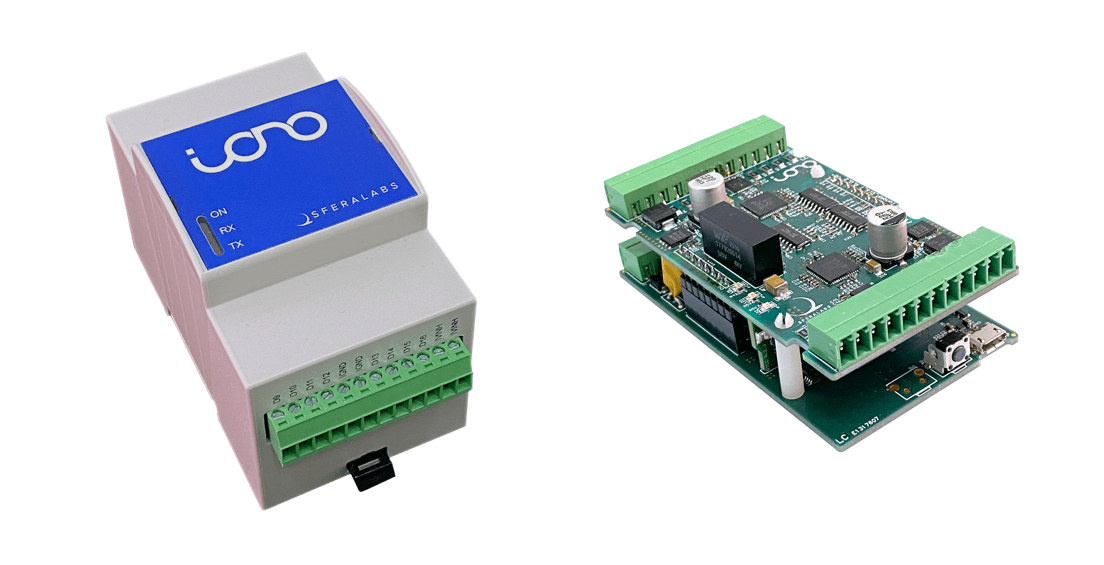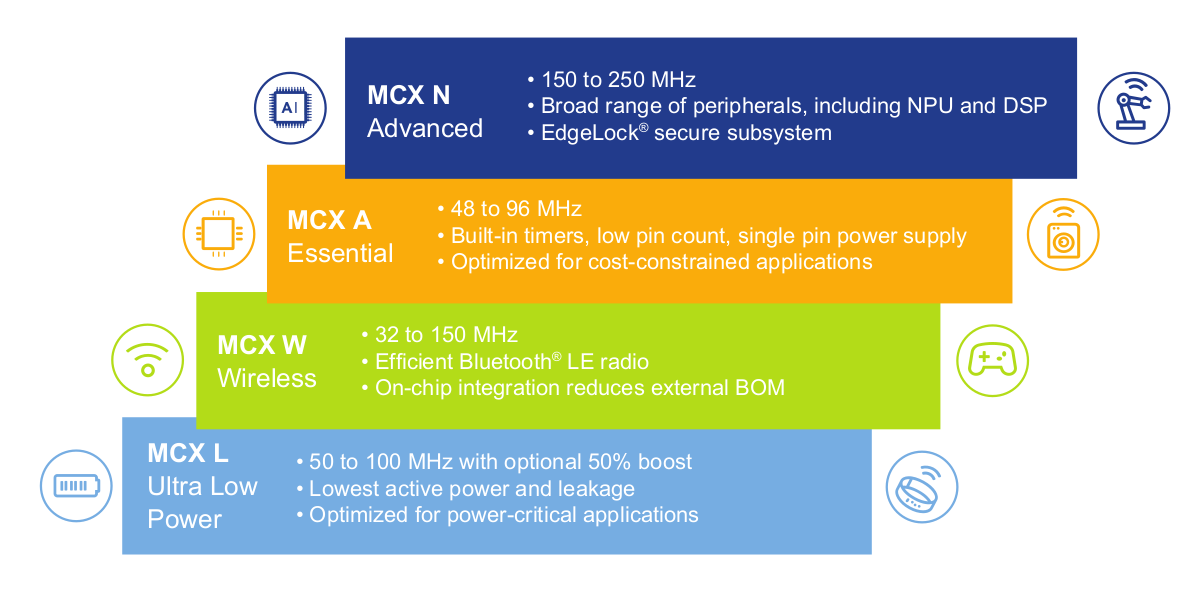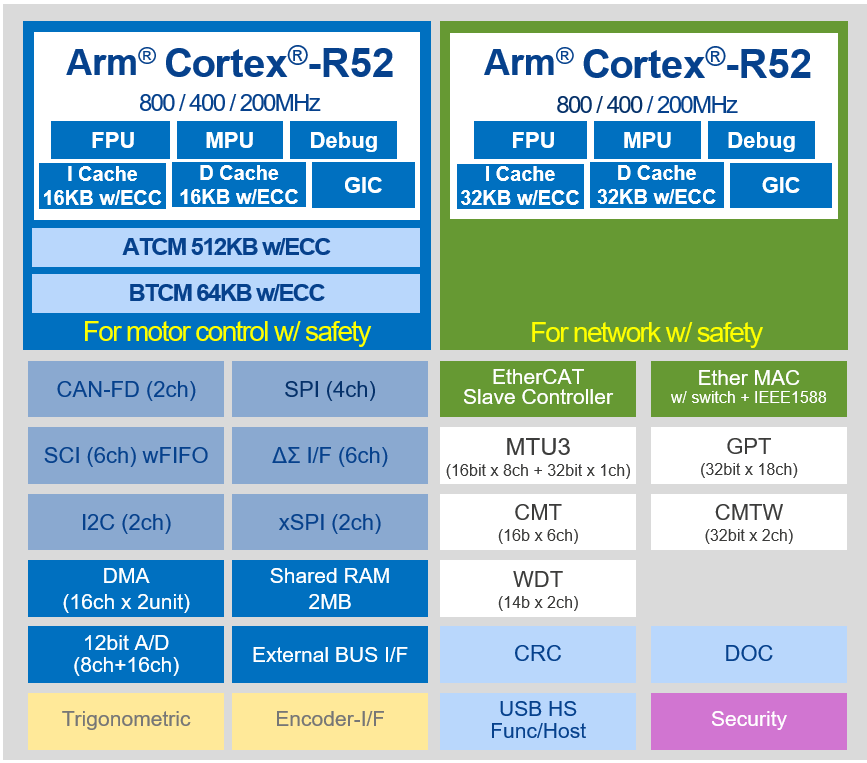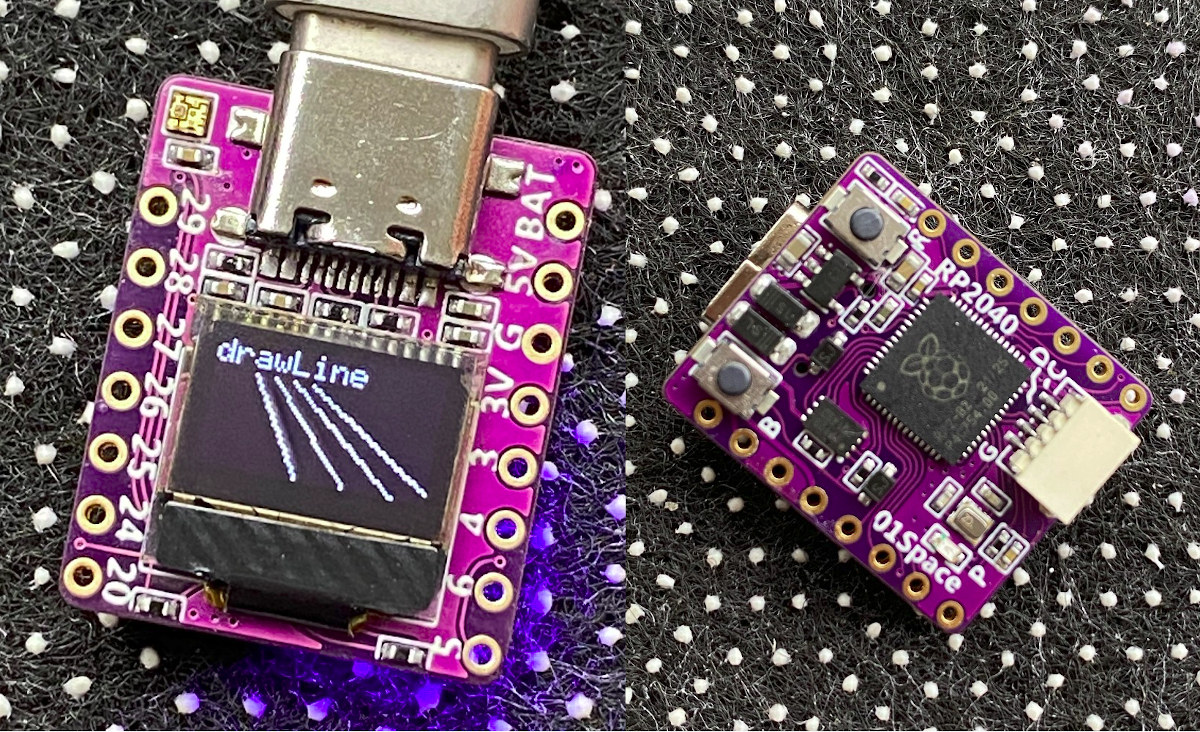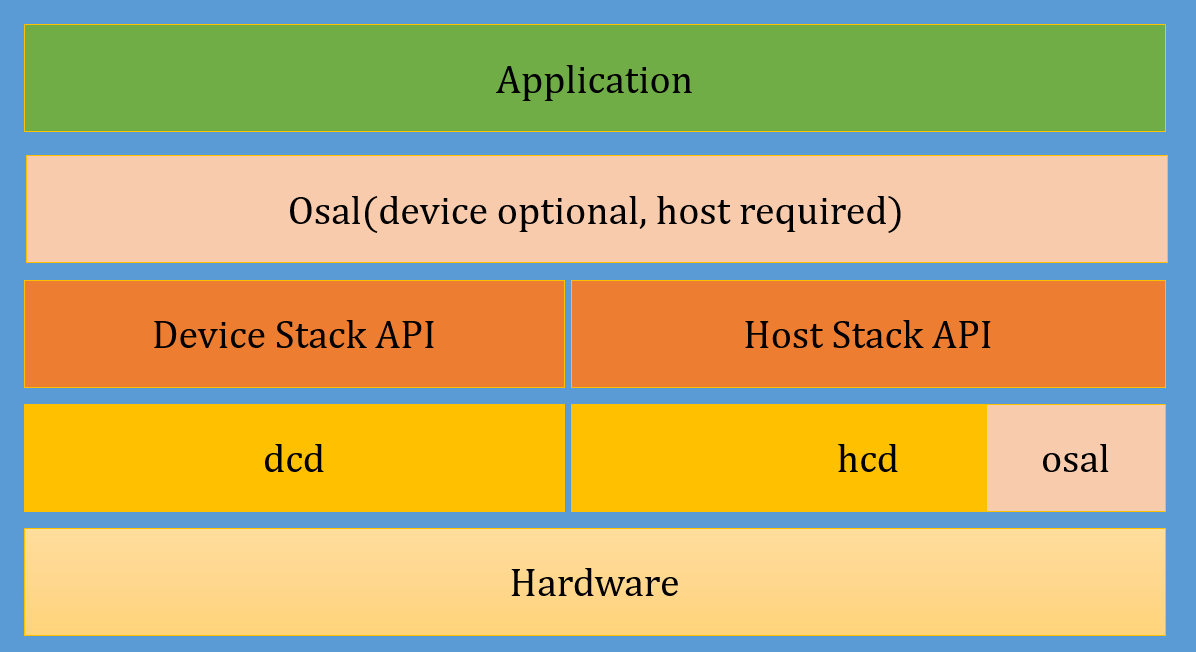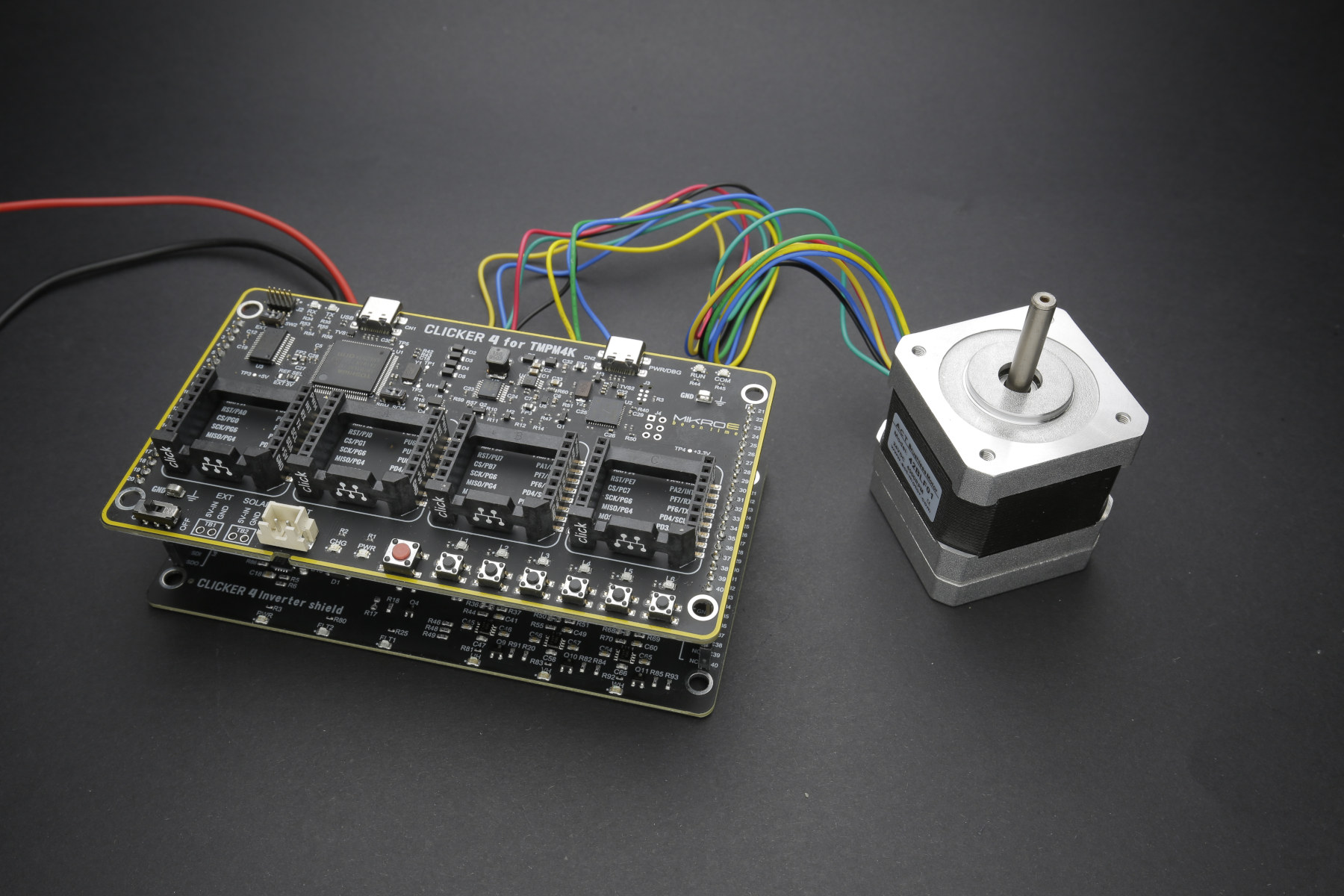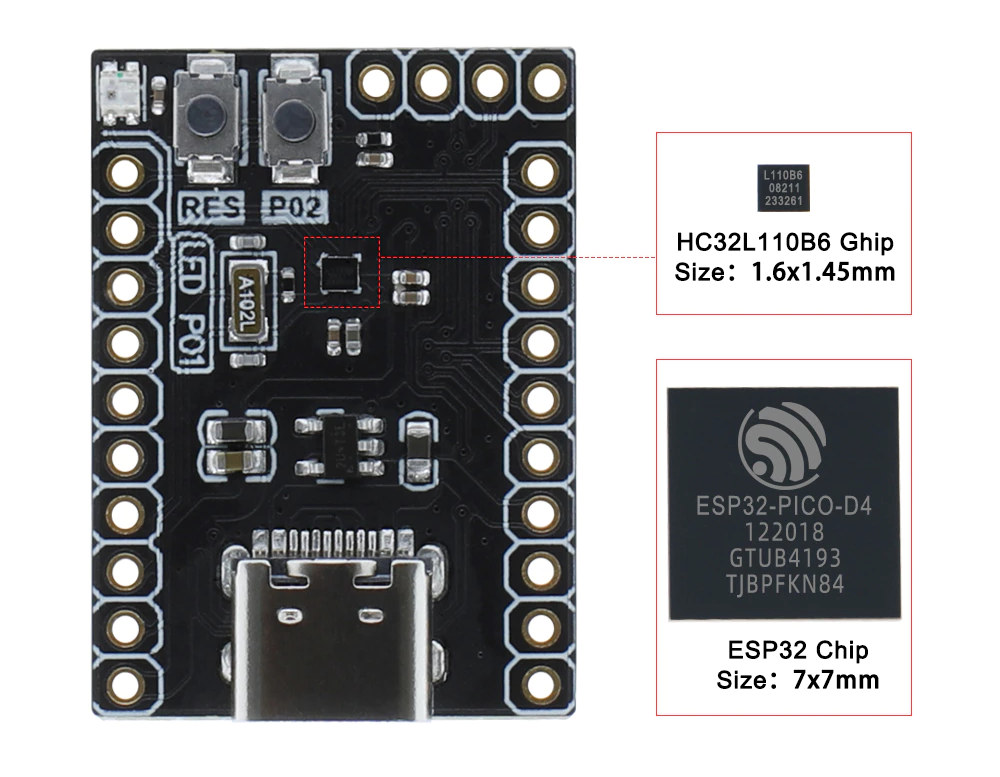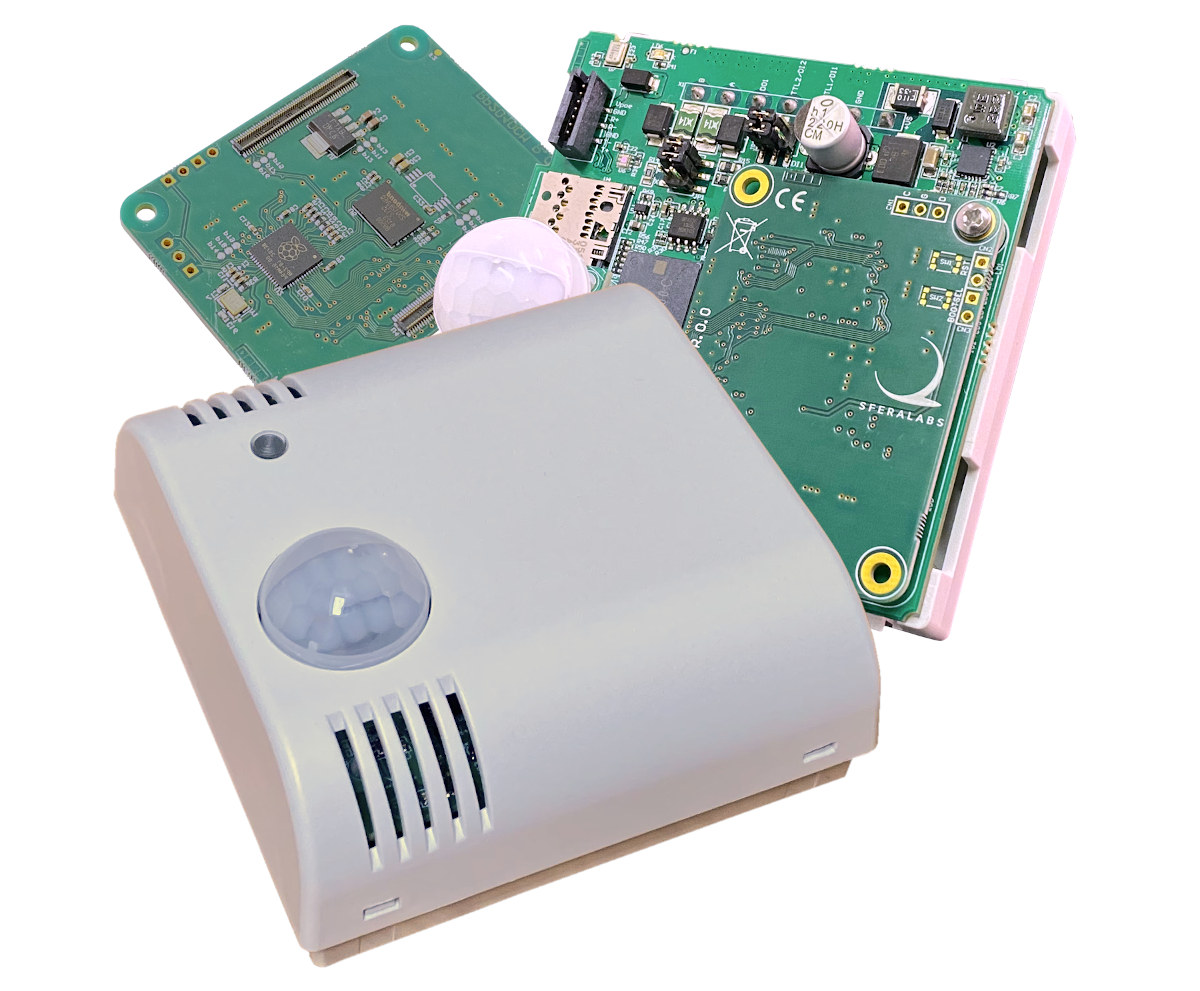Sfera Labs has launched another Raspberry Pi RP2040-based hardware platform with the Iono RP D16 industrial IO module following the Exo Sense RP multi-sensor module we covered last month. The Iono RP D16 module provides sixteen digital 24V I/O lines, an RS-485 serial interface, a wide range 12-28V power supply input, and its DIN-rail case enables installation in electrical cabinets and automation control systems. Iono RP D16 specifications: MCU – Raspberry Pi RP2040 dual-core Arm Cortex-M0+ microcontroller @ 133MHz with 264kB on-chip SRAM Storage – 16MB SPI flash Inputs/Outputs via terminal blocks Up to 16x 24V 640mA outputs driven by high-side switches that can also be configured as push-pull drivers for high-speed switching (via MAX14912 chips) Up to 16x 24V IEC 61131-2 compliant current-sinking inputs (via MAX22190 chips) 4x TTL level I/Os (1-Wire, I2C, Wiegand support) Serial – RS-485 interface to the RP2040 serial lines via terminal block with electrostatic […]
NXP unveils MCX general-purpose Arm MCU family with 30x faster machine learning performance
NXP has announced a new MCX general-purpose Arm Cortex-M MCU family designed for advanced industrial and IoT edge computing and integrating an NXP neural processing unit (NPU) capable of delivering over 30 times higher performance than running the AI inference tasks on an Arm Cortex-M33 core alone. The new MCX portfolio builds upon the earlier NXP LPC and Kinetis microcontroller families, but does not replace these, and aims to improve machine learning performance and security for a variety of applications including machine learning, wireless, voice, motor control, analog, and more. The new MCX family will be available in four series: MCX N Advanced series Designed for secure, intelligent applications 150 MHz to 250 MHz Neural processing unit (NPU) and DSP for real-time inference EdgeLock Secure Subsystem MCX A Essential series Optimized to provide critical functionality for applications such as motor control 48 MHz to 96 MHz Built-in timers, low pin […]
Renesas RZ/T2M dual Arm Cortex-R52 MPU delivers high-precision servo motor control
Built around two Arm Cortex-R52 cores clocked at up to 800 MHz, Renesas RZ/T2M microprocessor units (MPUs) target real-time, high-precision motor control applications such as AC servo drives and industrial robots. The RZ/T2M microprocessor also supports Ethernet with TSN and functional safety, and has been designed in such a way to reduce the number of external components in order to both decrease the BoM costs and the product size. Renesas RZ/T2M key features and specifications: CPU – Up to 2x Arm Cortex-R52 cores clocked at up to 800MHz, one core for motor control, and the other for networking Trigonometric function accelerator Memory – Tightly coupled memory 576KB with ECC, 2MB RAM with ECC Storage I/F – Octa/Quad SPI support Networking 3-port Gigabit Ethernet switch with TSN Industrial Ethernet: EtherCAT, PROFINET RT/IRT, EtherNet/IP, etc… Motor control 2-channel encoder interface with support for A-format, EnDat, BiSS, HIPERFACE DSL, Tamagawa Functional safety support […]
Raspberry Pi RP2040 board comes with 0.42-inch display, Qwicc I2C connector
We’ve recently written about ESP32-C3-0.42LCD board with ESP32-C3 wireless microcontroller, a 0.42-inch display, and a Qwicc connector for expansion. But it turns out the developer, 01Space, has also launched an almost identical board, RP2040-0.42LCD, with Raspberry Pi RP2040 MCU replacing the ESP32-C3 WiFi and Bluetooth MCU. RP2040-0.42LCD board specifications: SoC – Raspberry Pi RP2040 dual-core Cortex-M0+ microcontroller at up to 125 MHz, with 264KB SRAM Storage – 2 MB SPI flash Display – 0.42-inch OLED USB – 1x USB Type-C port for power and programming Expansion Qwiic I2C connector 7-pin and 8-pin headers with up to 11x GPIOs, 2x SPI, 2x I2C, 4x ADC, 1x UART, 5V, 3.3V, VBAT, GND Misc Reset and Boot buttons RGB LED, power LED Power Supply 5V via USB-C port or Vin VBAT pin for battery input 3.3V regulator with 500mA peak output Dimensions – 23.5 x 18 mm Weight – About 2.5 grams The […]
CherryUSB – A lightweight USB device/host stack for embedded systems
CherryUSB is a lightweight open-source USB device/host stack for embedded systems with one or more USB interfaces. The stack implements various class drivers such as CDC, HID, MSC, audio, video, and so on. It’s apparently part of Boufallo Lab SDK (e.g. for BL702 MCU), and has been ported and tested with WCH CH32V307 RISC-V MCU, STMicro STM32F4, and Nuvoton NUC442 Cortex-M4 microcontroller, as well as a two Arm Cortex-M3 microcontrollers I’ve never heard of: EastSoft ES32F3 and MindMotion MM32L3xx. CherryUSB device stack highlights: Support for USB2.0 full and high speed Endpoint irq callback USB classes support Composite Device Communication Device Class (CDC) Human Interface Device (HID) including “Custom HID” Mass Storage Class (MSC) USB VIDEO Class (UVC1.0,UVC1.5) USB AUDIO Class (UAC1.0, UAC2.0) Device Firmware Upgrade CLASS (DFU) MIDI CLASS (MIDI) Test and Measurement CLASS (TMC) Vendor class Remote NDIS (RNDIS) support Support WINUSB 1.0,WINUSB 2.0 with BOS (Binary Device Object […]
Clicker 4 for TMPM4K board targets motor control with Toshiba M4K microcontroller
Toshiba and Mikroelektronika have launched the Clicker 4 for TMPM4K development board equipped with Toshiba M4K Arm Cortex-M4 microcontroller for motor control, as well as four mikroBUS sockets for MikroE Click expansion boards. The Clicker 4 for TMPM4K board is also fitted with an on-board CMSIS-DAP compliant Debug Unit based on Toshiba’s TMPM067 MCU, extension connectors, JTAG/SWD debug ports, LED indicators and push buttons, and works best with Clicker 4 Inverter Shield with six MOSFETs for motor driving, a 48V switching power supply, and a 5V regulated power source that can power the M4K board. Clicker 4 for TMPM4K specifications: MCU – Toshiba TMPM4KNFYAFG 32-bit Arm Cortex-M4 microcontroller @ up to 160 MHz with 256KB code flash, 32KB data flash, 24KB SRAM, as well as Vector Engine (A-VE+), Encoder and Programmable Motor Driver (PMD) for brushless DC motors Expansion 4x mikroBUS sockets for adding Click board 40x connection pads with […]
LilyGO T-HC32 board with the world’s smallest Arm MCU (HC32L110B6) is now available for $9
HC32L110 Arm Cortex-M0+ MCU is found in a minuscule 1.59 x 1.436 mm CSP16 package that should make it the world’s smallest Arm MCU. LilyGO T-HC32 is one of the first boards with the HC32L110B6 microcontroller, and it is now available for $8.98 on Aliexpress including shipping. The board offers really basic features with two buttons, a WS2812 RGB LED, and two-row of ten pins each for GPIOs and power signals, plus a 4-pin header for SWD programming. There’s nothing really special about the board or its price, except for the MCU’s size that’s barely discernable from a discrete component, and much smaller than the 7x7mm ESP32-PICO-D4 system-in-package shown in the photo below for comparison. LilyGO T-HC32 board specifications: MCU – HDSC HC32L110B6 Arm Cortex-M0+ @ up to 32 MHz with up to 4KB RAM, up to 32KB flash memory Expansion – 2x 10-pin header with GPIO, UART, I2C, […]
Exo Sense RP – A Raspberry Pi RP2040-based multi sensor module
Sfera Labs Exo Sense RP is a multi-sensor module with a Raspberry Pi RP2040 microcontroller and various sensors to report temperature, humidity, air quality (VOC), light intensity, audio, and motion. The module can work as a standalone unit but can also communicate with a host through RS485 and USB interfaces, and supports expansion via surge-protected digital inputs and outputs. The Exo Sense RP is designed for indoor residential and commercial applications such as environmental monitoring and data logging, people and assets tracking, room management, access control, and more. Exo Sense RP specifications: MCU – Raspberry Pi RP2040 dual-core Arm Cortex M0+ @ 133 MHz with 264KB SRAM Storage – 16MB flash memory Communication ports RS485 half-duplex up to 115200 bps, with surge protection Micro USB 1.1 Type-B connector Sensors Sensirion SHT40 temperature and humidity sensor Sensirion SGP40 air quality (VOC) sensor Texas Instruments OPT3001 light intensity sensor TDK ICS-43432 digital […]


